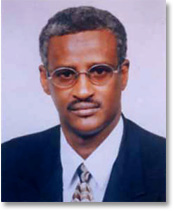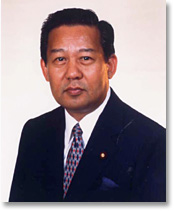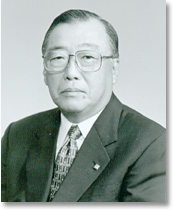- H.E. Mr. Abdirashid Dulane, Ambassador
- H.E. Mr. Toshihiro Nikai
President of the Japan-Ethiopia Parliamentary Friendship League Minister of Economy, Trade and Industry - Dr. Sadao Umeda
President of the Ethiopian Association of Japan Chairman of Kajima Construction Co., Ltd.
H.E. Mr. Abdirashid Dulane Ambassador
Working with partners will achieve rapid, sustained development

H.E. Mr. Abdirashid Dulane
Ambassador
Prime Minister’s visit to Ethiopia, as the political capital of African and the first country to establish diplomatic relations with Japan, has undoubtedly strengthened and consolidated the historic, traditional and robust relationship between the peoples of the two countries. The Japanese leader’s stay in our country had so many highlights: the joint visit of the two Prime Ministers to the recently renovated National Palace gardens to enjoy a traditional coffee ceremony and watching lions; Prime Minster Koizumi’s tour of the ground water institute (soon to be upgraded to regional training center); and gala thrown on his behalf at the Palace in the presence of President Girma Wolde-giorgis, Prime Minister Meles Zenawi and other high level officials, which featured a wonderful performance by a traditional dance troupe representing all Ethiopia’s nationalities; and the visit to Africa Union head-quarters in Addis Ababa.
Prior to Prime Minister Koizumi’s visit, Dr. Sadao Umeda, the President of Ethiopian Association of Japan and President of Kajima Construction Co. had an audience with President Girma Wolde-giorgis at the National Palace.
This highlighted how our leaders value the promotion of people to people relations and recognized the efforts of the association, particularly the dedication of Dr. Umeda.
On this National Day occasion it gives me great pleasure to express and wish great health and long life for Their Majesties Emperor Akahito and Empress Michiko and continued prosperity and peace to the Government and people of Japan.
Fifteen years have elapsed since the demise of the dictatorial Derg regime and the taking root of a system based on peace, development and democracy. During this period Ethiopia has undergone a massive transformation economically, socially and politically.
Policies & programs intended to reduce poverty formulated and implemented during past years have shown rapid broad based and sustainable economic development that have benefited all our people.
Steady growth averaging 5 percent to 6 percent has been achieved in the last decade and for the last three years a steady double digit growth was registered. Diversification of agriculture as the engine of growth is being witnessed. Coffee, which for so long has dominated the export business for decades, has been joined by other commodities. Oil seeds, spices, hides and skins, flowers and beeswax, etc are gaining ground in international markets.
Marked improvements in infrastructure development have been registered. New constructions and rehabilitation of roads are becoming frequent and ubiquitous. The number of beneficiaries for electricity, telecommunication and water supply has rapidly increased.
Social services such as education and health has been given special emphasis and all indicators show a rapid and broad based improvement with remarkable participation of the people.
Education and health sector development programs devised to enhance the education and health coverage of the nation (jointly financed by government and donors) has registered remarkable results.
The government has embarked upon an aggressive capacity building program in every sector and the recently introduced civil service reform program in public institutions have began transforming institution and is changing the way the nation’s civil service conduct business.
The next five years Program for Accelerated and Sustained Development to End Poverty (PASDEP) gives special emphasis to enhancement of activities in these areas and a universal access accelerated program has been formulated for most of these sectors. We expect in some sectors reaching MDG targets by then.
Ethiopian’s trade relations with Japan are robust and increasing in volume from year to year. Japan is the second largest Ethiopian coffee importer next to Germany and may overtake it soon. At this juncture I would like to commend the large trading houses Mitsubishi, Mitsui, Itochu and Marubeni and other companies who have supplied Ethiopian coffee in different forms to Japanese market and consumers and would like to implore them to consider value adding mechanisms to better benefit importers, exporters, farmers and consumers alike.
The government of the Ethiopia believes the new "One Village One Product" initiative of Prime Minister Koizumi will have a profound effect in enhancing trade between Japan and other developing countries, including Ethiopia which will aggressively participate to benefit from it.
Ethiopia is among the primary benefactors of Japanese Overseas Development Assistance. Japan provides meaningful assistance for the road sector, food security, water supply, health and education as well as environmental protection.
We are very grateful to the government and people of Japan for their continued generous and tangible support for the various development efforts in our country. Noted among the projects is the Abay Bridge to be built over the Nile, which our Prime Minister called it " a lasting monument" during recent visit of Prime Minister Koizumi. The Japanese leader’s announcement to double the volume of ODA to Africa and according to areas of priority to countries is welcome news for the continent. In light of this, I invite Japanese NPOs to work in assisting Ethiopia stamp out poverty and attain MDG targets.
Ethiopia is graced by an unprecedented investment boom. New businesses are sprouting all around. Investment in agriculture, construction, industry, etc is commendably instituted investment-conducive polices and regulations. I call upon the Japanese investors to take part in this investment bonanza and invest in their sector of choice. Rest assured we will be with you all the way to assist you in realizing your investment dreams in our potentially rich country.
Tourism is another sector for which the government is jointly working with the private sector. For the first time a Ministry of Tourism and Culture has been established. Cognizant of the fact that tourist potential of the nation is untapped, the government, in addition to the improvement made, will be undertaking an ambitions improvements in tourist infrastructure-construction, upgrading and rehabilitation of roads, hotels and transport facilities, and improving and opening up new tourist sites.
Ethiopia enjoys "13 months of sunshine," is a cradle of human kind, is home to the one and only live lava ash in the world (Artale) and is among others the owner of world-class historic, cultural and scenic sites. Come, bring your family and friends with you, I assure you, you will be received with unparalleled hospitality and unspoiled traditional welcome that only, Ethiopia can provide.
During my brief stay in Japan I have witnessed the friendly and industrious nature of the Japanese people. My country and people can learn a lot from their counterparts in Japan. I look forward to going out and visit communities, businesspeople, civil societies, educational institutions, etc. throughout Japan to exchange views & promote the long-standing multifaceted Ethio-Japan relationship.
On this auspicious occasion, I want to honour and commend the Japan-Ethiopia Parliamentary Friendship League, The Ethiopian Association of Japan, Mocha Dance Group and all other friends of Ethiopia and my compatriots living in Japan for their continues support and promotion of people-to-people relations.
H.E. Mr. Toshihiro Nikai President of the Japan-Ethiopia Parliamentary Friendship League Minister of Economy, Trade and Industry
Present-day issues call for traditional friendship to expand into a new cooperative relationship

H.E. Mr. Toshihiro Nikai
President of the Japan-Ethiopia Parliamentary Friendship League
Minister of Economy,
Trade and Industry
Ethiopia is the sole nation in Africa that has maintained independence for as long as 3,000 years.
Japan has also managed to be independent throughout its history, except for several years following the defeat in World War II.
Relations between Ethiopia and Japan began in 1927 with the conclusion of an amity and trade treaty.
Ethiopia is the country where coffee, now indispensable in Japanese daily life, originated Abebe Bikila:s wonderful victory in the 1964 Tokyo Olympic marathon is still vivid in our memories.
And at the Aichi Would Expo 2005, the Ethiopian pavilion displayed the estimated 3.5 million-year-old hominid fossils "Lucy" daily attracting a large number of visitors during the six months of the expo.
I still appreciated that as minister in charge of the exposition.
We remember that the emperor of Ethiopia kindly delivered a large amount of money to the Japanese hard hit by a calamity in Fukuoka Prefecture in 1957.
Although we have good longstanding bonds of friendship, I think it is time in the 21st century that we restructured a new cooperative relationship.
Ethiopia’s position as a leader in Africa has been improving year by year, and Japan has been trying to further enhance its solidarity with the international community for peace and development, using its economic strength and experience in the world. Most Africa countries are important friends and partners of Japan.
Prime Minister Junichiro Koizumi recently visited Addis Ababa as the first Japanese Prime Minister to go to Ethiopia and discussed areas of cooperation with Prime Minister Meles Zenawi.
When I was secretary general of the Japan-Ethiopia Parliamentary Friendship League in 1985, I visited Ethiopia, which was then suffering from a severe drought, to do what I could to help the sufferers. Whenever I have visited Addis Ababa since, I could not help but be impressed by its vitality and great potential, seeing the country rapidly changing, particularly with a cityscape dotted with office buildings for the African Union and other international organization.
In the 21st century, peoples around the world need to make concerted efforts toward solving such global issues as energy and the environment beyond their differences in race and religion. Japan and Ethiopia must further strengthen their traditionally friendly relationship and continue cooperation for humankind.
To bolster the cooperative relationship, it is essential to promote familiarity through mutual exchanges and understanding. As an old adage says, "Seeing is believing." And I believe people-to-people exchanges in cultures and sports go a long way toward building a bridge between Japan and Africa. I learned much about Ethiopia when I first visited the country in 1985.
My lifework is promoting international friendship through tourism. And I express my determination to continue to do my best to promote the friendship between Japan and Ethiopia.
Dr. Sadao Umeda President of The Ethiopian Association of Japan Chairman of Kajima Construction Co., Ltd.
People-to-people exchanges strengthen bilateral relations, bring nations closer

Dr. Sadao Umeda
President of The Ethiopian Association of Japan
Chairman of Kajima Construction Co., Ltd.
With a 35-year history this year, our association has promoted people-to-people exchanges aiming for the betterment of bilateral relations as well as world peace. Members who love Ethiopia have continued their efforts to develop goodwill activities, such as a scholarship program, fundraising and cultural exchanges through an active human network.
It was also encouraging to witness that "Ethiopian Night for Cuisine and Dance" our popular annual event held last October, attracted as many as 400 participants.
Last November, we celebrated the 50th anniversary of the resumption of diplomatic relations between Japan and Ethiopia by sending a goodwill mission of nearly 40 delegates to Ethiopia. They attended the memorial ceremony hosted by Ethiopian President Girma Wolde-giorgis at the beautifully restored Japanese Garden of the Jubilee Palace in Addis Ababa.
During their stay, they drove to a primary school in the county-side to donate 240 desks and chairs, visited local NPOs and an orphanage, met Addis Ababa University scholarship students we support, exchanged Ethiopian and Japanese dances at every possible opportunity, ran and walked in the Great Ethiopian Run marathon race among 20,000 participants, including world-famous Ethiopian athletes, and surely enjoyed traveling the breathtaking historical route to Lalibela and Axum.
Among the delegates were two Japanese women who had worked at the Jubilee Palace 50 years ago at the invitation of then Emperor Haile Selassie. They revisited the palace and enjoyed a reunion with some of their co-staff members at the time.
On the resumption of diplomatic relations, Japan sent other specialists to Ethiopia, like technical advisers on digging hot springs and growing oranges, or political and financial advisers. We are deeply moved by learning that such historical human ties have been maintained between the two countries since then and even before.
Yet, it was a really auspicious event to see Prime Minister Junichiro Koizumi visit Ethiopia for the first time from April 29 to May 1 on the first leg of a trip that also took him to Ghana and Sweden. The images of Ethiopian Prime Minister Meles Zenawi and Mr. Koizumi chatting at the Japanese Garden teahouse over Ethiopia’s traditional coffee ceremony were nicely televised. Then Mr. Koizumi pleaded at the African Union to focus doubly Japan’s aid on measures to help African countries become economically independent.
I am also happy that I was able to make a trip to Ethiopia for the first time a few days before Mr. Koizumi’s visit. I was greatly honored by an audience with President Girma, who expressed his sincere gratitude to our association for its contributions and friendship.
To date, we, as a nation, have been exerting strenuous efforts in promoting friendly relations between our two countries. I sincerely wish Ethiopia every success in its quest for prosperity and stability.

